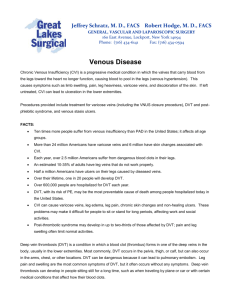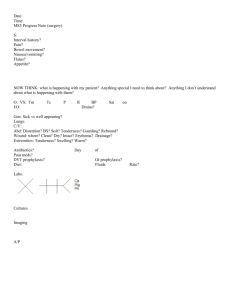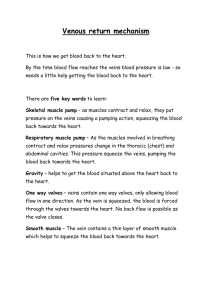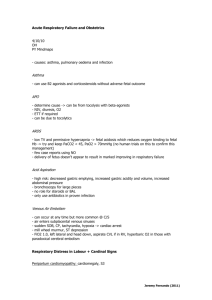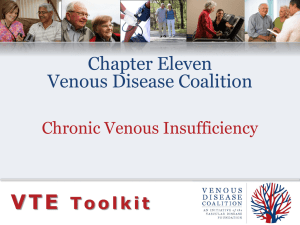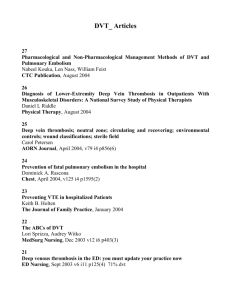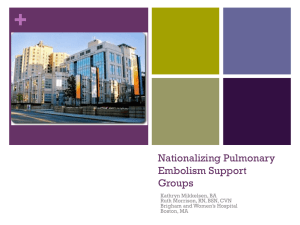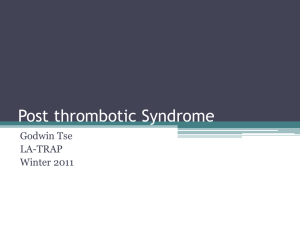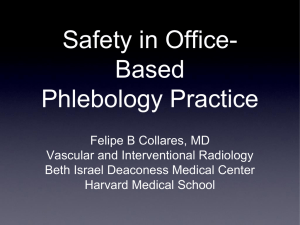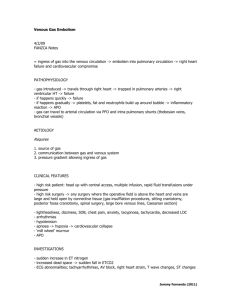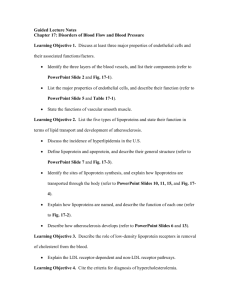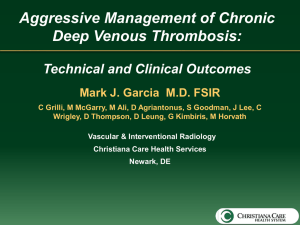06-CV3-arteries
advertisement
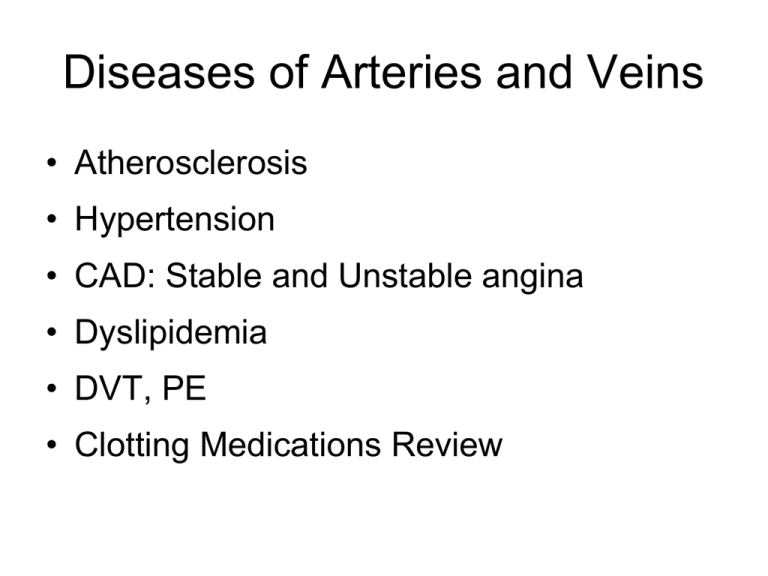
Diseases of Arteries and Veins • Atherosclerosis • Hypertension • CAD: Stable and Unstable angina • Dyslipidemia • DVT, PE • Clotting Medications Review Hypertension • Primary • Secondary • Isolated Systolic hypertension (aortic sclerosis in elderly) • Postural (orthostatic) • Malignant (DBP > 120) – Causes encephalopathy – Associated with general anesthesia Hypertension • Pathophysiology – – – – – Vasoconstriction Increased contract Increased HR Increased volume Arterial & Heart remodeling – RAAS activation • Drugs – – – – – Alpha-1 blockers Beta blockers ACE inhibitors ARBs Calcium channel blockers – Diuretics – Other Embolus • • • • • • Thromboembolism Air Embolism (diving, trauma, injection) Amniotic Bacterial Embolism Fat embolism Foreign matter (usually from injection) – Drug precipitate, glass, linen fibers Arteriosclerosis • Hardening of arteries – Fibrotic – Atherosclerotic • Shape – Eccentric – Concentric Atherosclerosis • Inflammatory disease – Endothelial injury – Fatty streak formation – Fibrotic plaque – Complicated lesion Endothelial Dysfunction • Risk factors – – – – – – Smoking High blood pressure Cholesterol Sedentary life Homocysteine Turbulent blood flow • “Novel” Risk factors – – – – – – CRP Serum fibrinogen Insulin resistance Oxidative stress Infection Periodontal Disease Injured Endothelium • Inflamed – Produces less vasodilating hormones – Produces less antithrombotic hormones – Inflammatory molecules cause damage – Growth factors released (SMCs) – Macrophages adhere • Oxidation of LDL • Foam Cell formation Atherosclerotic Plaque • Fatty streaks found in children as young as ten years old • Develops fibrous cap – Hard candy coating on the outside – Delicious liquid center • Complicated lesion – Fibrous cap breaks – Contents spill out – Thrombus forms • Partial or complete occlusion or embolus Manifestations of Athersclerosis • None until severe or event – Collateral circulation • • • • Legs: Claudication Coronary: Reduced exercise tolerance Renal artery: hypertension CV Event (complicated lesion) – Stroke, MI – Death Collateral Circulation Eval & Tx of Atherosclerosis • • • • Risk factors risk factors Family history Endothelium function test Localized perfusion studies – Doppler – ECG, Echo, Angiogram, Stress test • Tx: – Tx BP & cholesterol, anticoagulant – Life style – Treat localized ischemic lesions Treatment of Localized Lesions • Bypass surgery – Use another artery – Use a piece of vein – CABG, Fem-pop • Heart catheterization (PCI) – Percutaneous Transluminal AngioplastyPCTA – Stent – Thrombolysis Peripheral Arterial Disease • Atherosclerotic • Thromboangitis obliterans (Buerger’s Disease) • Raynaud’s disease/phenomenon – Peripheral vasospasm – Treat with alpha-blockers – Raynaud’s phenomenon often accompanies other illnesses • E.g., SLE Diseases of the Veins • Varicose veins & Venous insufficiency – Enlarged tortuous veins – Failure of valve – May lead to insufficient venous return • • • • • Functional decrease in preload Hyperpigmentation of feet Edema Sluggish circulation in lower extremities Venous stasis ulcers DVT • ~10-26% of hospitalized patients may develop – Highest risk for shock, stroke, MI, CHF, malignancy • ~100% risk in – Orthopedic trauma/surgery – Spinal cord injury – Some OB/gyn conditions • Patient with coagulation disorders DVT • Factors that promote DVT – Venous stasis • Immobility, meds, posture – Venous endothelial damage – Hypercoagulable states • Inherited, malignancy, pregnancy, OCs, HRT • Manifestations & Eval – Pain, Swelling, Redness, +Homan’s sign – Doppler ultrasound • Tx: Prevention, Anticoagulation
